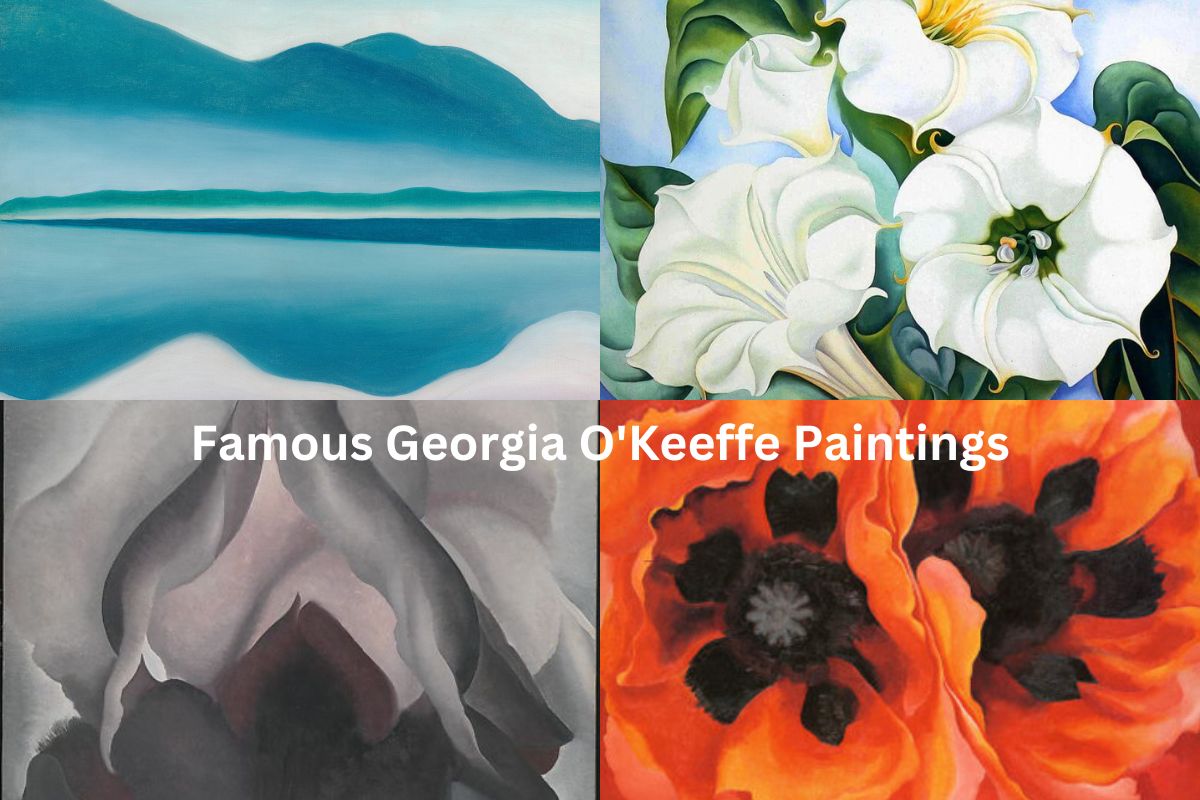Georgia O’Keeffe stands as one of the most influential American artists of the 20th century, renowned for her unique interpretations of the natural world and her distinctive style.
Through her iconic paintings, O’Keeffe captured the essence of flowers, landscapes, and everyday objects in a way that transcended mere representation, inviting viewers to contemplate the beauty and mystery of the world around them.
We delve into some of O’Keeffe’s most famous works, examining the themes, symbolism, and artistic techniques that have made her a beloved figure in the annals of art history.
From the vibrant blooms of “Jimson Weed” to the transcendent beauty of “Ladder to the Moon,” each painting offers a glimpse into O’Keeffe’s unique vision and her enduring legacy as a pioneering artist.
Georgia O’Keeffe Famous Paintings
1. Jimson Weed
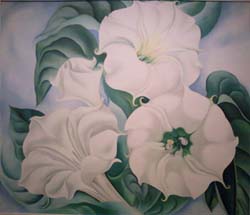
“Jimson Weed” is one of Georgia O’Keeffe’s most iconic works and a quintessential example of her style. Painted in 1936, it features a close-up view of a large white flower known as Jimson weed or Datura.
O’Keeffe’s fascination with nature and her ability to magnify and abstract the forms of flowers is evident in this painting. By isolating the flower and presenting it on a large scale, she invites viewers to appreciate its intricate details and subtle beauty. The flower fills the canvas, dominating the composition with its graceful curves and delicate petals.
O’Keeffe’s use of color, particularly the subtle gradations of white, creates a sense of luminosity and depth, imbuing the flower with a sense of vitality and presence.
Through “Jimson Weed,” O’Keeffe invites viewers to contemplate the beauty of the natural world and encourages a deeper connection with the wonders of the plant kingdom.
2. Black Iris III
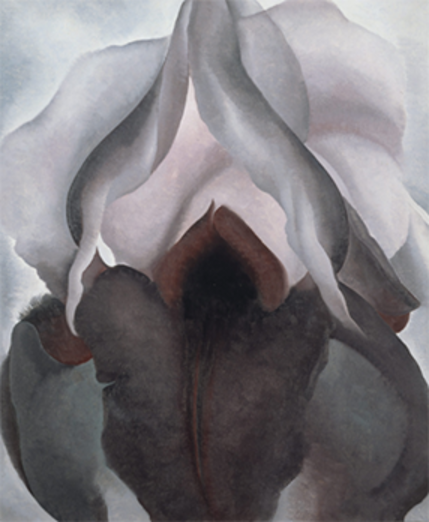
Painted in 1926, “Black Iris III” exemplifies Georgia O’Keeffe’s mastery of form and color. In this painting, she presents a close-up view of a black iris flower, capturing its intricate structure and sensual beauty.
Her decision to isolate the flower against a solid background allows the viewer to focus solely on its form and color, enhancing its visual impact. The stark contrast between the dark petals of the iris and the background emphasizes the flower’s elegance and mysterious allure.
O’Keeffe’s meticulous attention to detail is evident in her rendering of the iris’s delicate petals and intricate patterns, which seem to pulse with life and energy.
By magnifying the flower and presenting it in a larger-than-life scale, O’Keeffe invites viewers to experience the iris in a new and transformative way, encouraging them to appreciate the beauty and complexity of the natural world.
3. Oriental Poppies
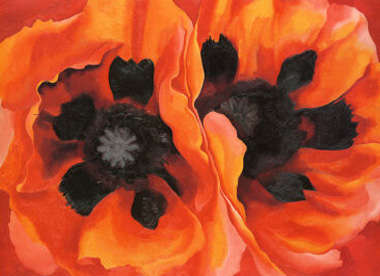
Painted in 1928, “Oriental Poppies” is a vibrant and dynamic portrayal of one of nature’s most colorful flowers. In this painting, Georgia O’Keeffe presents a close-up view of red poppies against a vivid blue background, creating a striking contrast that captures the viewer’s attention.
O’Keeffe’s bold use of color and form lends the poppies a sense of vitality and energy, as if they are bursting forth from the canvas. The flowers’ intricate details, such as their delicate petals and prominent stamens, are rendered with precision and clarity, showcasing O’Keeffe’s skill as a painter.
By isolating the poppies and presenting them on a large scale, O’Keeffe invites viewers to immerse themselves in the beauty of the natural world and encourages them to contemplate the fleeting nature of life and beauty.
“Oriental Poppies” is a testament to O’Keeffe’s ability to capture the essence of her subjects and evoke a sense of wonder and awe in her viewers.
4. Cow’s Skull: Red, White, and Blue
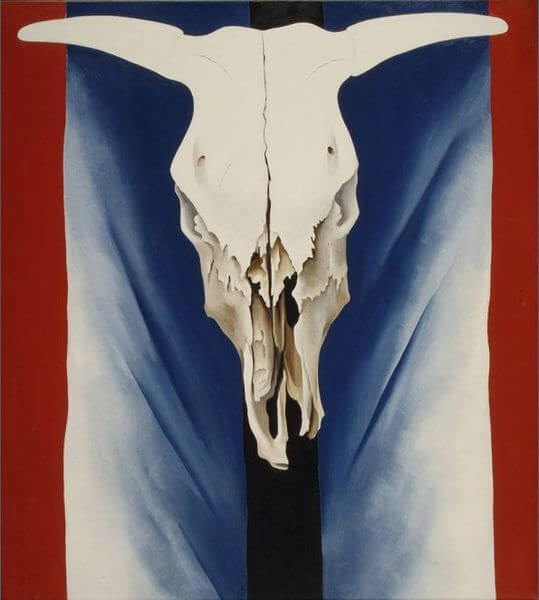
Painted in 1931, “Cow’s Skull: Red, White, and Blue” is a striking example of Georgia O’Keeffe’s exploration of symbolism and the American Southwest. In this painting, O’Keeffe presents a cow’s skull adorned with the colors of the American flag—red, white, and blue.
The skull, a recurring motif in O’Keeffe’s work, symbolizes both the harsh realities of life and death in the desert landscape of New Mexico and the enduring spirit of the American West.
By juxtaposing the skull with the patriotic colors of the flag, O’Keeffe creates a powerful visual statement that invites viewers to contemplate themes of mortality, identity, and national pride.
The bold contrast between the stark white of the skull and the vibrant red and blue hues adds to the painting’s impact, drawing attention to the tension between life and death, beauty and decay.
“Cow’s Skull: Red, White, and Blue” reflects O’Keeffe’s fascination with the landscape and culture of the American Southwest and her ability to infuse her work with layers of meaning and symbolism.
5. Sky Above Clouds IV

Painted in 1931, “Cow’s Skull with Calico Roses” is another example of Georgia O’Keeffe’s exploration of the desert landscape and its symbolism. In this painting, O’Keeffe presents a cow’s skull adorned with a bouquet of colorful calico roses.
The contrast between the stark white of the skull and the vibrant colors of the roses creates a sense of tension and dynamism, highlighting the beauty and fragility of life against the backdrop of death and decay.
O’Keeffe’s use of the cow’s skull as a symbol of the American Southwest and her incorporation of flowers as a motif of vitality and renewal imbue the painting with layers of meaning and metaphor.
The juxtaposition of the skull and the roses invites viewers to contemplate themes of life and death, beauty and transience, and the enduring cycle of nature.
Through “Cow’s Skull with Calico Roses,” O’Keeffe invites viewers to explore the complexities of the human experience and the interconnectedness of all living things.
6. Cow’s Skull with Calico Roses
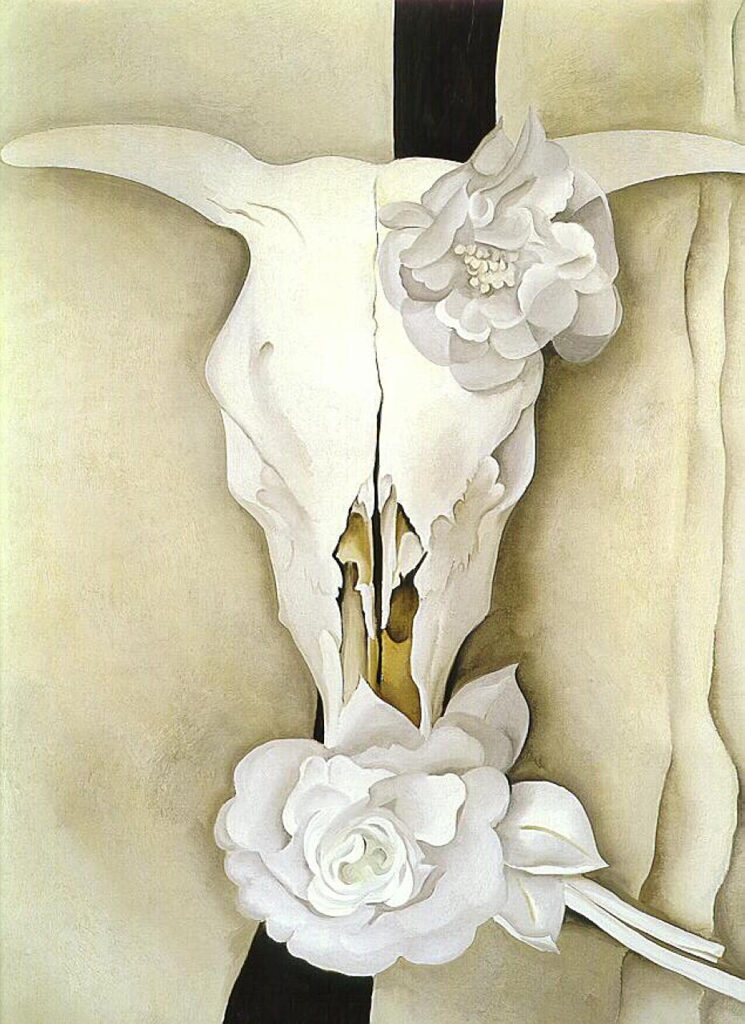
Among Georgia O’Keeffe’s diverse body of work, “Cow’s Skull with Calico Roses” stands as a compelling testament to her ability to infuse everyday objects with profound symbolism and beauty.
Painted in 1931, this masterpiece offers a captivating exploration of life, death, and the interconnectedness of all things.
From the stark contrast between the skull and the vibrant roses to the broader themes of mortality and renewal, “Cow’s Skull with Calico Roses” invites viewers on a journey of exploration and introspection.
7. The Lawrence Tree
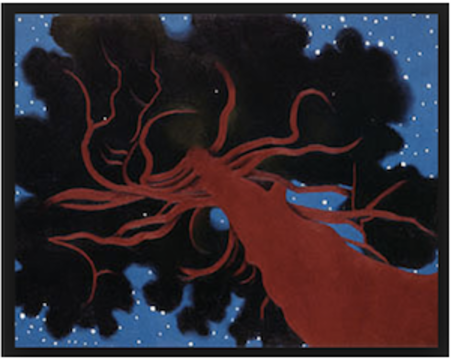
Painted in 1929, “The Lawrence Tree” is a landscape masterpiece by Georgia O’Keeffe that captures the essence of the New Mexico landscape. This painting depicts a solitary tree against a vast sky, its branches stretching out in graceful curves.
The tree, named after the poet D.H. Lawrence, symbolizes strength, resilience, and the enduring spirit of the American Southwest. O’Keeffe’s use of bold colors and simplified forms imbues the scene with a sense of majesty and mystery, inviting viewers to contemplate the beauty and tranquility of the natural world.
“The Lawrence Tree” is a testament to O’Keeffe’s ability to capture the essence of a place and evoke a sense of wonder and awe in her viewers.
8. Lake George [formerly Reflection Seascape]
![Lake George [formerly Reflection Seascape]](https://www.artst.org/wp-content/uploads/2021/11/Lake-George-formerly-Reflection-Seascape.jpg)
Painted in 1922, “Lake George” (formerly known as “Reflection Seascape”) is one of Georgia O’Keeffe’s early works that showcases her interest in capturing the beauty of the natural world.
This painting depicts the tranquil waters of Lake George in upstate New York, where O’Keeffe spent summers with her husband, the photographer Alfred Stieglitz. The calm waters reflect the surrounding landscape, creating a sense of serenity and harmony.
O’Keeffe’s use of color and light captures the ephemeral quality of the scene, evoking a sense of peace and tranquility. “Lake George” is a testament to O’Keeffe’s ability to find beauty in the ordinary and to convey the essence of a place through her art.
9. Red Canna
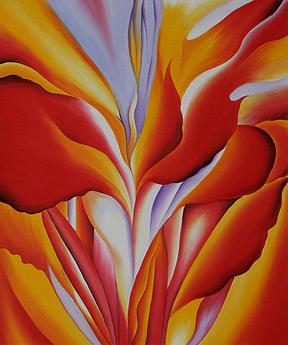
Painted in 1924, “Red Canna” is a vibrant and dynamic portrayal of one of Georgia O’Keeffe’s favorite flowers. This painting depicts a close-up view of a red canna flower, its petals unfurling in a riot of color and form.
O’Keeffe’s use of bold, saturated hues and simplified forms captures the essence of the flower, evoking a sense of vitality and energy. The canna flower, with its fiery red petals and prominent stamens, becomes a symbol of passion, beauty, and the cycle of life.
O’Keeffe’s ability to magnify and abstract her subjects allows viewers to see the flower in a new and transformative way, encouraging a deeper appreciation of the natural world.
10. Ladder to the Moon

Painted in 1958, “Ladder to the Moon” is a mystical and evocative painting by Georgia O’Keeffe that explores themes of transcendence and spirituality. In this painting, O’Keeffe presents a ladder extending upward toward a crescent moon in a dark, starry sky.
The ladder, a recurring motif in O’Keeffe’s work, symbolizes ascent, transformation, and the pursuit of higher truths. The moon, with its ethereal glow, represents mystery, intuition, and the unknown.
O’Keeffe’s use of bold colors and simplified forms creates a sense of depth and movement, drawing viewers into the dreamlike landscape. “Ladder to the Moon” is a meditation on the human desire for transcendence and the eternal quest for meaning and enlightenment.

